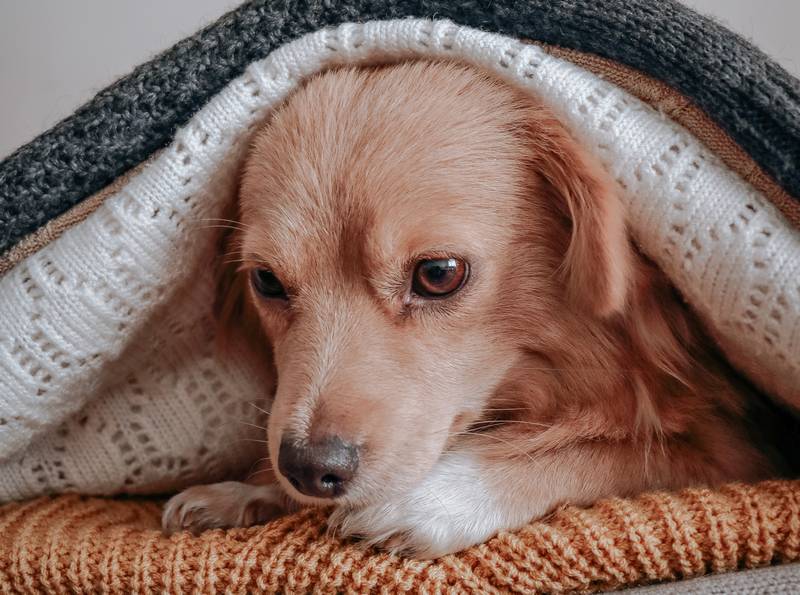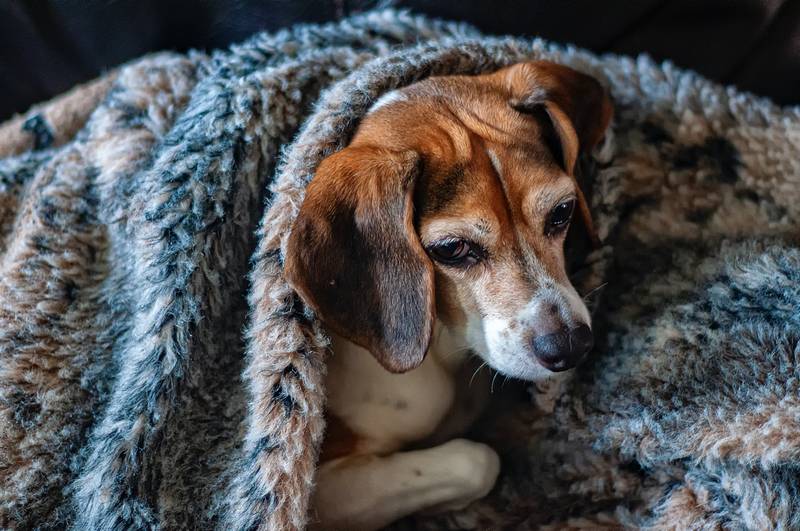Dog Chewing Blanket? Here’s How to Stop It!
Is your dog chewing blankets again and again and you have no idea why they do it or how to stop it? We’ve got you covered. In this article, we’ll discuss the possible reasons why dogs chew on blankets and provide you with steps on how to curb this behavior.
Whether it’s your dog nibbling blankets with his front teeth, chewing holes in blankets, or an excited or nighttime behavior, we’ll tackle all these different scenarios. We haven’t forgotten your young ones; we’ll also dive into why puppies chew blankets. Keep reading below!
Dog Chews Blanket: How to Stop

To stop a dog chewing blankets, you can use deterrents, provide alternative chew toys, manage their environment, or engage in training techniques such as redirection or the “leave it” command. The process involves understanding why your dog is chewing the blanket, which could be due to teething, boredom, anxiety, or habit, and then applying appropriate solutions.
- Provide Chew Toys: Dogs often chew to relieve boredom or stress. If your dog is chewing on blankets, providing a variety of chew toys can be a good alternative. This gives them a more suitable option for their chewing needs and keeps them occupied, reducing their focus on the blanket. Rotate the toys regularly to keep their interest. Puzzle toys filled with treats can also keep them engaged for longer periods.
- Redirection: Every time you see your dog starting to chew on the blanket, redirect them to a chew toy. This method helps your dog understand what they can and cannot chew on. Praise them or give a small treat when they chew on the toy to reinforce the positive behavior.
- Deterrent Sprays: There are sprays available in pet stores that have a taste or smell dogs don’t like. Spraying these deterrents on the blanket can discourage your dog from chewing it. Make sure to choose a pet-safe product and follow the instructions on the label.
- Manage the Environment: If your dog continues to chew on blankets despite the above measures, you might consider keeping the blankets out of their reach when you can’t supervise them. This helps break the habit over time and ensures the safety of your dog, as ingesting blanket material can cause intestinal blockages.
- Training Commands: Training your dog with commands like “leave it” or “drop it” can be helpful in stopping them from chewing on blankets. Start by teaching these commands using treats or toys, then gradually move to using the commands when they start to chew the blanket. Consistency and positive reinforcement are key to successful training.
These steps will get your dog to stop chewing blankets, but it’s important to remember that the underlying behavioral issue (anxiety, boredom, etc.) that was causing all of this to begin with will still be present. And until you address that, any positive changes you see are only going to be temporary.
“So, how do I make these changes stick?”
By getting your dog to truly choose to follow your direction, that’s how. I tried many times to write out how you can do that before deciding it made more sense to just link you to the free video series that explains it better than I’d ever be able to.
The series is by a man named Dan who is one of the world’s leading dog obedience trainers. In it, he teaches you how to put an end to things like when your dog chews blankets and all other misbehavior using his fast and easy-to-follow methods.
In the first video, Dan will reveal to you why the two most common methods of dog training only doom you to failure. You can watch the video now by clicking here. Follow the proven system he’ll show you in his series and you’ll never have to spend another second worrying about your dog chewing blankets ever again!
Why Does My Dog Chew on Blankets?

Dogs chew on blankets for various reasons, including teething, boredom, anxiety, hunger, or even just for comfort and entertainment. While this behavior can sometimes be a natural expression of their canine instincts, it could also indicate underlying issues that need addressing.
Teething
For puppies, the teething process can cause discomfort as their adult teeth begin to emerge. Chewing on soft items like blankets helps to alleviate this discomfort. If your puppy is going through the teething stage, provide them with chew toys that are safe and appropriate for their age.
Boredom and Lack of Exercise
Dogs, especially active breeds, require mental and physical stimulation. When they don’t get enough exercise or entertainment, they may resort to chewing on things, including blankets. Regular exercise and mental stimulation through puzzle toys, training, and social interaction can help mitigate this behavior.
Anxiety
Anxiety can lead dogs to exhibit compulsive behaviors, such as excessive chewing. Blankets may be targeted as they carry the owner’s scent, providing a sense of comfort and safety. If anxiety is the root cause, it’s important to address the underlying triggers, which we went over more in the first section.
Hunger and Nutritional Needs
If your dog is on a diet or isn’t getting the necessary nutrients from their food, they might start chewing non-food items like blankets. This behavior is known as pica and could be a sign of malnutrition. A visit to the vet for nutritional guidance would be beneficial in such cases.
Comfort and Entertainment
Sometimes, dogs simply chew on blankets because they enjoy the texture and find it comforting or entertaining. Chewing is a natural canine behavior and blankets can provide a soft, satisfying object to gnaw on.
How to Stop Excessive Chewing
Understanding why your dog is chewing on blankets is the first step to addressing this behavior. Always provide your dog with appropriate chew toys and consider using a dog-safe deterrent spray on the blanket. You should also teach the “drop it” command, which we explained in the first section.
Not doing anything gives your dog tacit approval for this behavior, and then it will only get worse. You’ll soon find your dog chewing socks, chewing on towels, chewing bed sheets, chewing their bed, chewing pillows, or even chewing rug corners. Obviously, this would get very old very fast, so it’s best to start handling things now.
Why Does My Dog Nibble Blankets With His Front Teeth?
When a dog nibbles blankets with his front teeth, it’s often a behavior known as “flea-biting” or “wool-sucking,” which can be attributed to a variety of reasons such as comfort-seeking, self-soothing, boredom, or even a sign of dental problems. To fully understand why your dog exhibits this behavior, it’s important to consider their overall behavior and health.
- Comfort and Self-soothing: Dogs nibble blankets often as a form of comfort-seeking behavior. This action can be compared to a human child sucking their thumb. Dogs might do this when they are relaxed or about to sleep. This can also be a self-soothing behavior, which helps them deal with stress or anxiety.
- Rooted in Puppyhood: Puppies often use their mouths to explore their world, and this can include nibbling on various objects, including blankets. While most dogs grow out of this behavior, some may continue it into adulthood, especially if it’s been a source of comfort for them.
- Boredom: If a dog is not provided with enough mental and physical stimulation, they may resort to behaviors such as nibbling on blankets. This is why it’s important to ensure that your dog gets enough exercise and has access to engaging toys.
- Dental Issues: If your dog is nibbling on blankets with their front teeth constantly, it might be due to discomfort or pain in their mouth. Dental problems such as gingivitis, tooth decay, or teething in puppies can cause this behavior. In this case, a visit to the vet would be necessary.
- Behavioral Issues: Compulsive behaviors, similar to obsessive-compulsive disorder in humans, can also lead to dogs nibbling on blankets. If the nibbling seems excessive or is accompanied by other unusual behaviors, it’s worth consulting a vet or a pet behaviorist.
In conclusion, dogs nibble blankets with their front teeth for various reasons ranging from comfort-seeking, boredom, dental issues, or even behavioral problems. We discussed the steps you need to take to stop your dog nibbling on blankets in the first section of this article.
Dog Chewing Holes in Blankets
If your dog is chewing holes in blankets, it could be due to factors like boredom, stress, comfort seeking, or teething (in the case of puppies). While blanket chewing can be a harmless behavior, it’s essential to understand and address the underlying reasons to prevent potential health risks, such as ingesting blanket material.
Boredom
A common reason dogs chew on blankets and create holes is due to boredom. Dogs, particularly energetic breeds, need both physical and mental stimulation. If they aren’t getting enough, they might turn to destructive behaviors like chewing. Regular exercise, playtime, and mentally stimulating toys can help keep your dog entertained and reduce destructive chewing.
Stress or Anxiety
Stress or anxiety can trigger excessive chewing in dogs. Chewing is a natural stress-relief mechanism for dogs, and blankets, especially ones that smell like their owners, can provide a source of comfort. If you notice signs of anxiety in your dog, such as separation anxiety, consider consulting a veterinarian or a professional dog trainer to address the issue.
Comfort Seeking
Chewing can provide a sense of comfort and satisfaction for dogs. Blankets often carry the owner’s scent, which can offer a sense of security to the dog. Furthermore, the texture of the blanket might be pleasing for your dog to chew, creating a sort of self-soothing behavior.
Teething
In puppies, teething is a common reason for chewing. As their adult teeth grow in, puppies might chew on blankets to soothe the discomfort. If teething is the cause, providing puppy-safe chew toys can help redirect their chewing behavior to more appropriate items.
Preventing Destructive Chewing
To stop your dog from chewing holes in blankets, ensure they have plenty of physical exercise and mental stimulation. Providing appropriate chew toys can also help. If anxiety is causing the chewing, use behavioral training to address this underlying issue, which we explain how to do in the first section.
Why Do Dogs Nibble on Blankets When Excited?
When dogs get excited, they often exhibit playful behavior, and nibbling on blankets can be one of these behaviors. This could be due to instinctual mouthing behaviors from puppyhood, self-soothing, sensory exploration, or a way of expressing joy. However, always remember to monitor this behavior to ensure it doesn’t escalate into destructive chewing.
Residual Puppy Behavior
As puppies, dogs often explore their world through their mouths, and this can involve a lot of nibbling on various objects, including blankets. Even as adults, when dogs get excited, they may revert to these puppy-like behaviors as an instinctual response. If your dog only nibbles when excited and doesn’t cause any harm, this could be the reason.
Self-Soothing
Nibbling or mouthing can be a form of self-soothing for dogs. The rhythmic action of nibbling can help them relax and manage their excitement. If your dog nibbles on blankets when they are excited, it may be their way of calming themselves down.
Sensory Exploration
Dogs have a highly developed sense of touch in their mouths, and nibbling allows them to explore different textures and sensations. When they’re excited, they may be more inclined to explore their environment, including the blanket’s texture, which can be very satisfying to nibble on.
Expression of Joy
Dogs have various ways of expressing joy and excitement, and for some dogs, this includes nibbling on blankets excitedly. This is their way of channeling their positive energy and showing you just how happy they are.
Stopping Nibbling on Blankets
While nibbling due to excitement is generally harmless, you might want to stop it, especially if it starts to become destructive. We explained the steps you need to take to do that in the first section of this article.
Why Does My Dog Nibble on Blankets at Night?
Dogs nibble on blankets at night due to various reasons such as comfort-seeking, a self-soothing mechanism, a need for warmth, or coping with anxiety. Understanding why your dog exhibits this behavior requires a look at their overall habits, behaviors, and health status.
- Comfort and Self-soothing: Just as humans have nighttime routines to help relax and prepare for sleep, dogs can also develop certain behaviors to comfort themselves before sleep. Nibbling on blankets can be a self-soothing behavior, similar to a child sucking their thumb. It helps them to relax and feel secure as they wind down for the night.
- Need for Warmth: Dogs, like their wolf ancestors, may nibble or “knead” their sleeping area (in this case, the blanket) to create a comfortable and warm spot to sleep. Nibbling on the blanket can also generate warmth through friction, which could be why your dog does it more often during the colder months.
- Anxiety: If your dog feels anxious or stressed, they may nibble on blankets as a coping mechanism. Anxiety can be triggered by various factors, such as separation from you, changes in the home, or fear of certain noises (like thunder or fireworks). If you notice that your dog’s nibbling coincides with signs of anxiety, it’s important to address the root cause of their stress.
- Excess Energy: If a dog doesn’t get enough physical exercise and mental stimulation during the day, they may have excess energy to burn off at night. This leftover energy might translate into behaviors such as nibbling on blankets. Ensuring your dog gets enough exercise during the day can help mitigate this behavior.
- Dental Issues: Some dogs might nibble on blankets due to discomfort or pain in their mouth. Dental problems like tooth decay or gum disease could lead to this behavior. If your dog only nibbles at night, it might be because the quiet and stillness make the discomfort more noticeable. In this case, it’s advised to consult a vet.
In summary, dogs nibble on blankets at night for reasons ranging from comfort-seeking, warmth, dealing with anxiety, or even dental issues. To stop your dog nibbling on blankets at night, go back to the first section. We’ll explain how to address the behavior itself and also the underlying issue which is actually causing it.
Puppy Chews Blanket
Puppies chew on blankets due to teething, exploration, boredom, or seeking comfort. While this is usually part of normal puppy behavior, it’s important to redirect the chewing to appropriate objects to prevent it from developing into a problematic habit as the puppy grows.
Teething
Like human babies, puppies go through a teething phase where their baby teeth fall out and adult teeth come in. This process can cause discomfort and a strong urge to chew. Chewing on soft items like blankets can provide relief to their sore gums.
Exploration
Puppies explore their world using their mouth. This means they’ll often chew on various items, including blankets, to learn more about their environment. They are drawn to different textures and tastes, and a blanket provides a new and interesting experience for them.
Boredom
Puppies have a lot of energy and need physical and mental stimulation. If they become bored, they may resort to chewing on things like blankets. Providing plenty of playtime, interaction, and chew toys can help divert their attention from the blanket to more appropriate items.
Seeking Comfort
Chewing can be a self-soothing behavior for puppies. They may find the act of chewing on a blanket comforting, especially if they are feeling anxious or lonely. The blanket’s soft texture and familiar scent can provide a sense of security and peace.
Redirecting Puppy Chewing Behavior
To ensure your puppy’s chewing habits don’t result in destroyed blankets or other items, it’s crucial to redirect this behavior towards more appropriate outlets. Provide a variety of chew toys that cater to different chewing needs. Also, consider using deterrent sprays on blankets to make them less appealing.
Training your puppy to understand “leave it” and “drop it” commands can also be beneficial. We went over this in the first section of this article. With patience and consistent training, your puppy will learn what is acceptable to chew on and what is not.
I’m sure you’re ready to quit finding holes in your blankets, so I’ll let you begin now. Best of luck with everything, and thank you for checking out our article “Dog Chewing Blanket: Why They Do It + How to Stop!”





